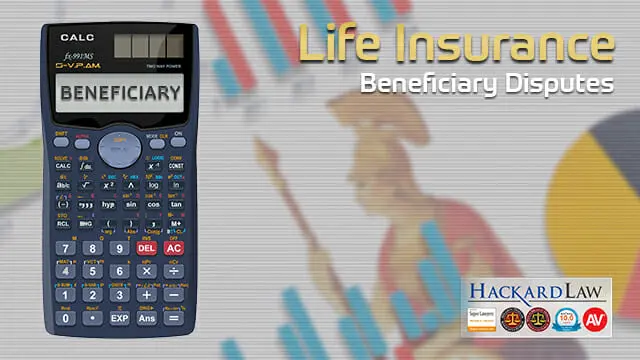
California Life Insurance Beneficiary Disputes | Litigation
Representing clients in California life insurance beneficiary disputes a part of what we do at Hackard Law in addition to our estate, trust and elder financial abuse litigation practice.
In 2017, “life insurance paid $77 billion to beneficiaries of policyholders who died.” (Am. Council of Life Insurers, Life Insurers Fact Book p. 65 (2018)). Individual life insurance policies constituted $55 billion of this total with group life insurance beneficiaries receiving the other $22 billion.
There are many ways that life insurance beneficiary designations are subject to challenge, among them change in circumstances, neglect, mistake, or poorly articulated intent. These challenges may have enormous economic consequences to the named beneficiary. At first glance, it may appear that any beneficiary designation is unassailable. Law and experience teach that what seems to be cast in concrete is not always so.
Let’s start with a basic outline of the mechanics of purchasing and effectuating life insurance policies. Life insurance policies are purchased on an individual or group basis. Life insurance is in essence a will substitute – it is a transfer of wealth whose execution need not be accomplished with the same formalities required of a will. Some legal scholars note that the effect of life insurance is in reality a nonprobate will.
Most policies do not impede the insured’s ability to amend the beneficiary designation any time before death. The beneficial interest in a life insurance policy is not fixed legally until the death of the insured. Until then it is only an unvested expectancy. A beneficiary is named when a life insurance policy is purchased. This designation identifies the recipients of the life insurance proceeds of the policy.
This sounds easy enough, so, how can complications arise? The first complication can be whether an active policy exists. It’s important to let loved ones know the location of any insurance policy documents. That said, policies may lapse or eligibility for group policies may cease.
Policies provide for death benefits – benefits that likely have conditions to payment eligibility. Once the existence of the policy is determined actions are necessary to document the insured’s death as part of the claims process. Assuming proper documentation, beneficiary designations may then be challenged.
Challenging a life insurance beneficiary designation or contesting a life insurance beneficiary is a rude shock to the named beneficiary. One of the most common challenges is brought by heirs or family members against a divorced spouse still listed as the primary beneficiary on the policy at the time of the decedent’s death. Such challenges are affected by state law and some substantial evidentiary hurdles. These cases are sometimes called revocation-upon-divorce presumptions.
Most cases resolve before trial because like any litigation, ultimate judicial results can be unclear. That said, there are times when an ultimate trial is entirely appropriate. Challenges by non-heirs and never-named beneficiaries may simply be a hold-up, a hold-up deserving rejection.
Unmeritorious challenges still put the insurance company at risk if they pay out the proceeds without a judicial determination. This causes insurance companies to interplead the proceeds into a trial court that will ultimately determine the rightful beneficiary of the proceeds. Life insurance beneficiary fights are one more aspect of disputes that can sometimes arise in nonprobate transfers.
Hackard Law represents clients is substantial cases where we believe that we can make a significant difference and there is a party who can be made accountable for financial wrongdoing. We litigate in California’s major urban areas. This year, 2019, we see an increasing focus on California’s Bay Area – Alameda, Santa Clara, Contra Costa, San Mateo and San Francisco Counties.
If you would like to speak with us about your case call us at Hackard Law (916) 313-3030. We’ll be happy to hear from you.

 (916) 775-8542
(916) 775-8542